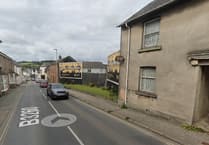Okehampton town councillors will discuss whether to ask MP Mel Stride to lobby for the reopening of a Minor Injuries Unit and hospital ward at Okehampton Hospital at their meeting on Monday.
The proposal, suggested by town councillor Tony Leech, follows a recent report by the South Western Ambulance Service which recommends that hospitals across the area implement the triage model used at the Royal Devon and Exeter (RD&E) Hospital and provide better minor injury unit access to reduce ambulance waiting times.
Cllr Leech said: ‘I have been trying to push for it for ages. We should bring the minor injury unit back. I know it’s at the medical centre but people are still sent to Exeter. It’s a long journey. I read the report and it said quite clearly that minor injury units should be closer to where people live.
Cllr Leech has argued that a minor injury unit and a hospital ward will ease bed-blocking at the RD&E as Okehampton residents will be able to recover closer to home, and pointed out that reopening the hospital would reduce travel time, expenses and fuel emissions as a result.
In the proposal he has put forward to the council, he wrote: ‘Would it be possible for Okehampton Town Council to agree to lobby for a new MIU to be reinstated within our hospital and run directly by the RD&E, so that local people can receive treatment locally, instead of having to travel to Exeter and clog up the system there?
‘I would also ask for the hospital beds to be reinstated here, as this would not only also ease the bed blocking at RD&E but would also help those who have to travel long distances to see their loved ones, with all the financial costs and carbon that this creates.’
Okehampton’s inpatient hospital beds closed in 2017 following a public consultation by the Northern, Eastern and Western Clinical Commissioning Group (CCG), the body responsible for the planning and commissioning of health care in the region.
The consultation concluded that Okehampton’s medical centre, which had only recently been opened, would be able to cope with the town’s hospital patients and it was subsequently closed down, despite fierce opposition and lobbying against the proposals by residents.
Okehampton’s hospital had included a ward and a full maternity service, which has been ‘temporarily closed’ for five years due to staffing shortages meaning any Okehampton woman giving birth must now travel to the RD&E, the next nearest hospital, or have a home birth.
Ambulance services across the country are currently struggling to keep waiting times as short as possible as the service battles with the after-effects of covid and long queues at hospitals meaning paramedics are unable to get back on the road.
Statistics gathered by the South Western Ambulance Service NHS Foundation Trust (SWAST) which covers Devon, Cornwall, the Isles of Scilly, Dorset, Somerset, Wiltshire, Gloucestershire and the former Avon area, has shown has had some of the highest handover delays in England.
In February, data showed that over 35 per cent of ambulances were delayed by 30 minutes in contrast to the south which reported that less than 15 per cent of its ambulance were delayed by half an hour.
The NHS standard states that ambulance handovers should not be delayed any longer than 15 minutes.
On May 30, 2021 SWAST declared a ‘critical incident’ due to ‘extreme pressures’ and tweeted that ‘some patients may wait longer for an ambulance’ after it got 3,200 calls in one day.
Four months later, on September 7, 2021 SWAST declared a ‘major incident’ after it announced that it had received 3,511 incidents the day before.
The Government has said that it will put in place a range of measures to ease the national crisis including employing more staff and giving extra funding to the NHS to keep ambulances on the road.




Comments
This article has no comments yet. Be the first to leave a comment.